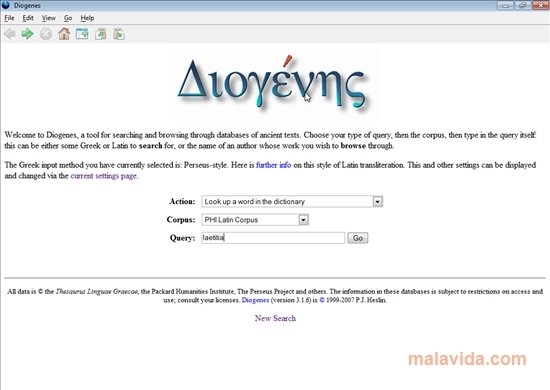I recently had the opportunity to read Christia Mercer’s recent paper on the influence of Teresa of Ávila’s influence on Descartes, along with Kenny Pearce’s interesting discussion of it on the Mod Squad.

Mercer’s discussion of the origins of Descartes’s Meditations reminded me of the following offhand comment from Hiram Caton:
There is also a free software package (GPL) called Diogenes, which is not listed on the TLG page. It runs under Mac OS X (10.3 or later), Windows and Linux, and can be set up as a networked server. The installation procedure has been much simplified in recent versions. After finding the entry, I can either i. Hit ⌘⏎ to open the text online or ii. Hit ⌃⏎ to open it offline (in case you have Diogenes installed). There are also some functions related to a software called DEVONthink. I highly recommend checking it out. I have written about how I use it here. There is no mystery to these functions. Diogenes is smart enough to know whether to search the Greek or Latin depending on your input language. When your results appear, you can click on other Greek/Latin words that are linked in the lexicons, but you won't be able to click on the links to items on the TLG/PHI disk.
The title and arrangement of the Meditations mimics a genre of devotional literature known as the “hexameron,” which consists of six meditations for the last six days of Lent. His audience would have known that Cardinal Bérulle, who enjoined Descartes to write down his philosophy, had composed a work by the same title, which depicted the devot search for religious truth.
Descartes’s interaction with Bérulle is well-known; a good summary is pp. 183-186 of Gaukroger’s biography of Descartes. But I have never seen any mention of a work of meditations by Bérulle outside of Caton’s article.
Diogenes Tlg Software Download
In fact, it’s not clear what, if anything, Caton is referring to. (There is no citation for this remark in the original paper.) The 1856 edition of the Oeuvres Completes of Bérulle has no work titled “Meditations.”
He did write several works entitled Elévations, which appear to be regularly classified as meditations. These are:
1. A 17-part Elevation to Jesus.
2. A 17-part Elevation to the Trinity.
3. A 15-Part Elevation to God
4. A 20-chapter Elevation to God, according to St. Madeleine
5. Vows to Jesus and Mary, in 31 parts
6. A Vow to God
7. A Vow to Mary
Diogenes Tlg Software Free
I have not read these works yet, only skimmed some of them, but none appears to be an obvious precursor to Descartes, much less a devotional hexameron. For now, I think that Caton might have made a mistake or been speaking of a work I have not yet been able to find.
